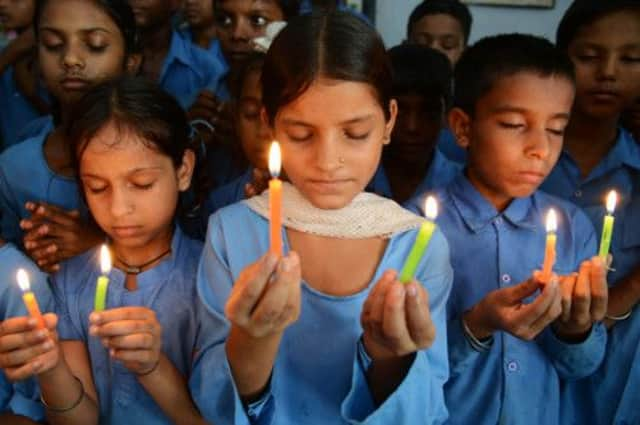India school meal poisoning: Death toll rises to 23


A full inquiry was promised by the government as concern grew over the quality of food given to pupils in a nationwide free school dinner project.
Scores of children fell ill within minutes of eating a meal of rice and potato curry in the eastern state of Bihar on Tuesday, the children began to fall ill, a cook at the school at the centre of the outbreak said yesterday from her hospital bed.
Advertisement
Hide AdAdvertisement
Hide AdThe children, aged four to 12, died after vomiting and convulsing from agonising stomach cramps, officials and relatives said. Death came so quickly for some that they died in their parents’ arms while being taken to hospital.
Dozens of other children are being treated for food poisoning in hospital.
Police said they were searching for the headmistress of the school in Gandaman village, in Saran district of Bihar, one of India’s poorest states, who has disappeared, along with her family.
The school provided free food under the Mid-Day Meal Scheme, the world’s largest school feeding programme involving 120 million children.
Police said it was not possible to conclusively say what caused the poisoning, but the focus of the investigation was on the oil used in preparing the meal. Doctors treating the children said it had been contaminated with insecticide. Media reports said the cooking oil may have been stored in an old pesticide container, but there was no independent confirmation of this.
“The minute the children were brought in, we smelled this foul odour of organophosphorus,” said Dr Vinod Mishra, a doctor treating many of the children at Patna Medical College Hospital in Bihar’s capital, Patna.
Organophosphorus compounds are used as pesticides, are widely available and sold under many different brands.
The medical superintendent of the hospital, Dr Amarkant Jha, said 23 of the 24 children there were recovering and were out of danger. One remained in a critical condition last night.
Advertisement
Hide AdAdvertisement
Hide AdPolice said witnesses had given different versions of how the children fell ill. Central to solving the mystery was finding the headmistress.
“She will be the key to the investigation as she will be the one who can share details about the quality of food and the supplier,” said Sujit Kumar, superintendent of police in Saran.
Parents said ingredients for the lunches such as rice, lentils, salt and oil, were stored at the headmistress’s house and brought to the school each day because there was no storage space at the school.
The “kitchen” is a pile of bricks and charcoal outside the single classroom.
Federal education minister MM Pallam Raju vowed that “action will be taken” against those responsible for the 23 deaths. He gave no details of the committee he was setting up to investigate free-meal food quality.
The announcement may be met with scepticism as the government often sets up committees to investigate issues which take years to report and rarely change policy.